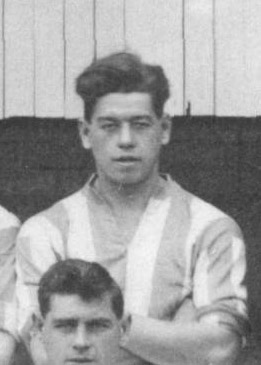

Roberts: Harry
1925-1930
(Player Details)
Right Back
Born: Crofton Nr Wakefield: 27-06-1904
Debut v Bury (a): 13-03-1926
5’7” 11st 9lb (1930)
He started his career playing in the Nostell area and, like Bert Duffield, his Leeds United
predecessor at right-back, he joined Midland League club Castleford Town in November 1923. He
was twenty when he joined Leeds in February 1925 and broke into the first team on a regular
basis in the 1926-27 campaign, when he ousted Jimmy Allan, who had replaced the long-serving
Duffield as Bill Menzies' full-back partner. In 1927-28, with the return of Ernie Hart, skipper
Tom Townsley was moved from centre-half to right back and both previous contenders were on the
outer. It was not until the start of the 1929-30 season that he finally regained his right-back
spot from Townsley but in January 1930 he found himself in a three-way fight for the full-back
spots with the emerging Jack Milburn and Bill Menzies. Although he commenced the 1930-31 season
in the number two position he soon lost it as Jack Milburn, and his brother George and Bill
Menzies overtook him in the fight for the two full-back positions. He left for Plymouth on 11th
November 1930 and was soon followed by his Leeds teammate, George Reed, six months later. He
made his Argyle debut 15th November in a 1-1 draw at Nottingham Forest and played his final
game on 1st May 1937 in a 0-1 defeat by Burnley at Home Park in the final fixture of the season.
In the interim he scored twenty-one times in making two hundred and forty-eight League
appearances, and nine further appearances in the F.A. Cup for the Pilgrims. He earned the
reputation as a firm tackler and a deadly penalty-taker in his almost seven years of service at
Home Park, in which he was appointed captain for several seasons. A transfer fee of £820 transfer
took him to Bristol Rovers in early September 1937 and he was immediately appointed club captain.
After seventy-seven League appearances in his two years at Eastville, in August 1939 he returned
to Yorkshire to play for Frickley Colliery. During the War he went back to Plymouth, where he had
been dubbed “The Rock of Gibraltar” in his playing days, and later ran a stall in the local
market. A keen golfer and bowls player, he died in Plymouth Naval Hospital on 18th May 1968.